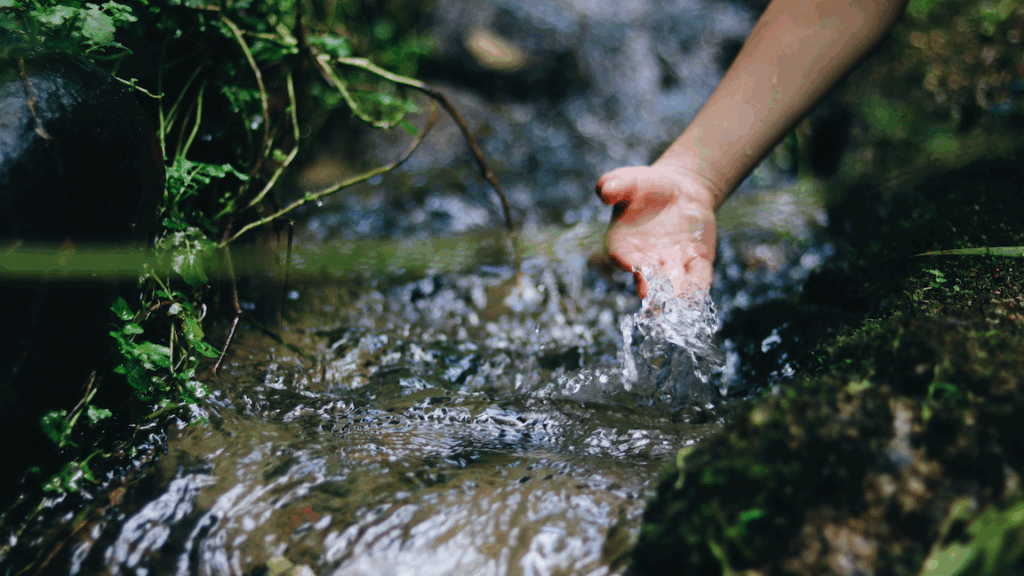
예레미야 2:11–13 (새번역) “비록 신이라 할 수 없는 그런 신을 섬겨도, 한 번 섬긴 신을 다른 신으로 바꾸는 민족은 그리 흔하지 않다. 그런데도 내 백성은 그들의 영광을 전혀 쓸데 없는 것들과 바꾸어 버렸다. 하늘아, 이것을 보고, 너도 놀라고 떨다가, 새파랗게 질려 버려라. 나 주의 말이다. 참으로 나의 백성이 두 가지 악을 저질렀다. 하나는, 생수의 근원인 나를 버린 것이고, 또 하나는, 전혀 물이 고이지 않는, 물이 새는 웅덩이를 파서, 그것을 샘으로 삼은 것이다.”
하나님께서 예레미야를 통해 이 말씀을 하실 때, 그분의 마음에는 깊은 슬픔과 거룩한 분노가 함께 자리하고 있었습니다. 이스라엘은 단순히 하나님의 명령을 어긴 것이 아니라, 하나님과의 관계를 끊어 버렸습니다. 그들을 구원하시고 사랑하신 하나님은 그들의 “생수의 근원”이셨습니다. 그러나 그들은 자신들의 생명을 유지시키시고 복과 번영을 주시는 그 생수이신 하나님을 버리고, 더럽고 악취가 나는 물처럼 아무 생명도 줄 수 없는 우상들을 선택했습니다.
이 비유는 우리가 반드시 기억해야 할 진리를 강력하게 보여 줍니다. “생수의 근원”은 끊임없이 흐르고, 맑고, 시원한 물을 내는 샘을 가리킵니다. 이 샘은 인간의 영혼을 새롭게 하시는 하나님 본인이십니다. 반면 “웅덩이”는 사람이 스스로 만든 인공 저장소에 불과합니다. 비가 오지 않으면 쉽게 메마르고, 고인 물은 금세 썩습니다. 더욱이 이스라엘이 판 웅덩이는 금이 가 있어서 물을 전혀 담을 수도 없었습니다. 이 웅덩이들이 바로 우상을 상징합니다. 우상은 하나님보다 더 의지하고 사랑하며, 우리의 안전과 의미, 행복을 거기에 두려 하는 모든 것입니다. 그것은 돌이나 금속으로 만든 형상일 수도 있지만, 돈, 성공, 관계, 쾌락, 편안함, 자아와 같은 것들로도 얼마든지 변할 수 있습니다. 죄는 언제나 이렇게 속입니다. 만족을 약속하지만 결국 공허하게 만들고, 즐거움을 준다고 속이지만 끝내는 쓰라림을 남깁니다.
수백 년 후, 예수님께서 이 말씀의 참된 성취로 자신을 드러내셨습니다. 예수님은 사마리아 여인에게 이렇게 말씀하셨습니다.
“그러나 내가 주는 물을 마시는 사람은, 영원히 목마르지 아니할 것이다. 내가 주는 물은, 그 사람 속에서, 영생에 이르게 하는 샘물(=‘생수의 근원’)이 될 것이다” (요한복음 4:14).
예수님은 자신이 바로 “생수의 근원”이심을 선포하셨습니다. 이스라엘이 버렸던 그 샘을, 예수님은 이제 자신을 믿는 자들에게 값없이 주십니다. 예수님의 십자가 죽음과 부활을 통해 하나님은 끊임없이 솟아오르는 용서와 기쁨, 그리고 영생의 샘을 열어 주셨습니다.
그러므로 생수이신 예수님께 등을 돌리는 것은, 이스라엘이 저질렀던 가장 큰 죄악을 되풀이하는 일입니다. 그러나 믿음으로 그분께 나아가는 자는 영혼의 갈증에서 벗어나 참된 생명을 얻게 됩니다. 예수님의 초청은 지금도 변함이 없습니다.
“목마른 사람은 다 나에게로 와서 마셔라” (요한복음 7:37).
오늘 우리도 다시 생수의 근원이신 예수님께 돌아가 우리의 갈증을 해소합시다. 그리스도 외의 어떤 것으로 우리의 마음을 채우려는 모든 시도는 하나님 앞에서 가장 큰 죄악이며, 결국 더 큰 공허와 쓰라림만 남길 뿐입니다. 그러나 그리스도의 은혜의 샘물을 깊이 마시는 자는 그 안에서 참된 만족과 영원한 풍요를 누리게 될 것입니다.
오늘 여러분의 눈앞에 있는, 영생과 참된 만족을 주는 “생수의 근원”과 더럽고 악취가 나는 “웅덩이의 물”중에서, 어느 것으로 목을 축이시겠습니까?
Jeremiah 2:11–13 (ESV) “Has a nation changed its gods, even though they are no gods? But my people have changed their glory for that which does not profit. Be appalled, O heavens, at this; be shocked, be utterly desolate, declares the Lord, for my people have committed two evils: they have forsaken me, the fountain of living waters, and hewed out cisterns for themselves, broken cisterns that can hold no water.”
When God spoke these words through Jeremiah, His heart was filled with both grief and righteous anger. Israel had not merely broken a rule; they had abandoned a relationship. The God who had rescued and loved them was the fountain of living waters, the source of all life and joy. To forsake Him was to cut themselves off from the spring that sustained their very being.
The image is powerful. A fountain of living waters is constantly flowing, clear, and refreshing. It represents God’s faithful presence that renews the soul. In contrast, a cistern is a man-made pit meant to store rainwater, often stagnant and dirty. Even worse, Israel’s cisterns were cracked, unable to hold any water at all. These cisterns symbolize idols—anything we trust, love, or pursue more than God in hopes of finding security, meaning, or happiness. Idols can be made of stone or metal, but they can also take the form of money, success, relationships, comfort, or self-reliance. This is what sin always does. It promises satisfaction but leaves us empty. It offers pleasure but delivers bitterness.
Centuries later, Jesus revealed Himself as the true fulfillment of what Jeremiah described. When He spoke to the Samaritan woman at the well, He said,
“Whoever drinks of the water that I will give him will never be thirsty again” (John 4:14).
In that moment, Jesus was declaring that He Himself is the fountain of living waters. What Israel had rejected, He now offered freely to all who would believe. Through His death and resurrection, He opened a never-ending spring of forgiveness, joy, and eternal life.
To turn from Him, then, is to repeat Israel’s greatest evil. But to come to Him in faith is to find the very life our souls were made for. The invitation still stands:
“If anyone thirsts, let him come to me and drink” (John 7:37).
Let us return today to the fountain that never runs dry. Every attempt to fill our hearts apart from Christ will only leave us thirstier than before. But when we drink deeply of His grace, we discover that He alone is enough.
Before you are two choices: the fountain of living waters that gives eternal life and true satisfaction, or the dirty, foul water of a broken cistern. Which will you drink from today?
